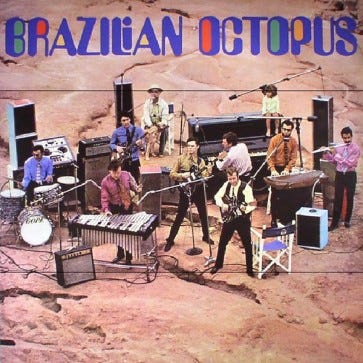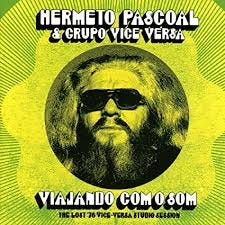The Deep Back Pages of a Musical Oracle
Jaw-dropping rarities from the multi-instrumentalist Hermeto Pascoal....
BRAZILIAN OCTOPUS: Brazilian Octopus. EMI (1969); reissued by Som Livre.
HERMETO PASCOAL: Viajando Com O Som: The Lost ’76 Vice Versa Studio Sessions — Far Out (1976, released 2017).
Just about every prolific musician with a long career has gaps in published output, moments between key career milestones that go unexplained, and thus can seem curious, odd, mysterious. Sometimes those intervals are just part of the creative process – reflecting study, or research, the development of new works or a new band that blossoms later.
And sometimes, the unaccounted-for periods encompass the entire life cycle of a project; it’s developed, executed and then abandoned, lost to history before anyone gets to experience it.
That’s true even for well-documented artists like Brazilian multi-instrumentalist Hermeto Pascoal, who has been recording since the late ‘60s both under his own name and in collaboration with others (he toured with Miles Davis during the Live/Evil run in 1970-71). There’s no shortage of unique must-hear works in Pascoal’s deep discography, which began in 1961 and ramped up considerably in 1967 with the lone record by his still-astonishingly-modern group Quarteto Novo.
Yet more artifacts keep surfacing, and these two – from different ends of a particularly fertile period in Brazilian music – help explain why Pascoal remains uniquely revered as an improvisor and catalyst.
Pascoal was hired to play flute on the lone record by Brazilian Octopus, a short-lived 8-piece brought together in 1969 by keyboardist Cido Bianchi to provide music for a runway show by fashion designer Livio Rangan, a longtime champion of Brazilian music. Judging by the sound, the order was for sleek background music with a touch of cop-show noir and a splash of mod-London nightlife. Bianchi rotates various instrumental colors (organ, vibraphone, guitar, flute) into the spotlight of tunes that venture ever so slightly from the conventional – his vision for cha cha or bossa nova involves assymetrical melodies and rich post-bebop harmony. Pascoal sets the tone right away, with an impulsive solo that enlivens the reflecting-pool calm of “Gamboa.” Even when some of the arrangements are overly stylized – see the “update” of Faure’s “Pavane” – the solos from Pascoal and the others exude a wonderful birdlike freedom. Bianchi was influenced by Quarteto Novo and the Mercury big-band records of Quincy Jones, among other landmarks; at times it’s possible to hear Pascoal (and the soloists who clearly follow his lead) delighting in their ability to momentarily derail the well-oiled machine.
As a result of his touring with Davis, Pascoal spent lots of time in the U.S. in the early ‘70s. His Quarteto Novo bandmate Airto Moriera hired him for significant recording sessions, including the lost classic Seeds On the Ground, which teamed the two of them with bass legend Ron Carter. After a few years of the US hustle, however, Pascoal became homesick, and decamped to Sao Paulo to begin the next chapter of his career.
This period led to his most stirring work, the experimental Slaves Mass (1977). Before that, though, came Viajando Com O Som, a fleeting gem made over two days in 1976, with Pascoal chasing music that was focused on what he sometimes described as channels of “spiritual” communication. Then as now, Pascoal’s operation was decidedly old-school: He put together a band of “Paulistas” and expected them to be available for rehearsals regularly (sometimes daily), even if there were no gigs on the calendar. He wrote elaborate, technically challenging suite-like pieces, and used the rehearsals to refine and expand his ideas; some days the band would be augmented by a saxophone section, or guitarist Toninho Horta.
After a particularly invigorating concert, Pascoal decided to record the group, live, with all the players in one room at Vice Versa studio in Sao Paulo. The master tapes were evidently lost; the 2017 release was drawn from what appears to be the only remaining copy, requested by drummer Zé Eduardo Nazario at the end of the session.
The work opens in a listless rubato mood that evokes the exploratory, gathering-storm episodes of Davis’ In a Silent Way and Bitches Brew; “Danca do Paje” grows very slowly, with Pascoal using several instruments and noisemakers (he’s known to have used a live pig as a percussion instruyment) to cultivate what becomes a boisterous, contentious conversation. This music at times shares the chamber-group ethos of Brazilian Octopus – particularly on the flute-choir “Natal (Tema das Flutas)” – but is much looser, defined by snakelike extended melodies and frolicsome free-jazz passages.
Pascoal continues to record and perform; his 2017 No Mundo Dos Sons is a marvel of spontaneity that showcases the quick reflexes of his touring band. For all we know, there are countless records like Brazilian Octopus and Viajando Com O Som tucked away in boxes in attics and studio libraries. One development that suggests we may eventually hear whatever else exists: A longtime member of Pascaol’s touring band, keyboardist and professor Jovino Santos Neto, has begun working on Pascoal’s abundant (and clearly not centralized) archive. Neto is perfect for that job, because for 15 years, he was part of them band onstage when Hermeto Pascoal rearranged the molecules. As Neto told NPR in 2017: "Hermeto is music. He is the current. He's like a source or a spring that's just gushing that water, and that water is music.”
Yes, we have a fancy digital suggestion box. Share your favorite Underloved/Overlooked records here: echolocator@gmail.com.
Please consider subscribing (it’s free!). And…..please spread the word! (This only works via word of mouth!)







